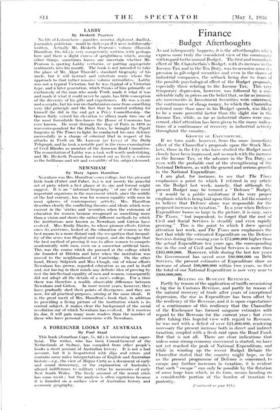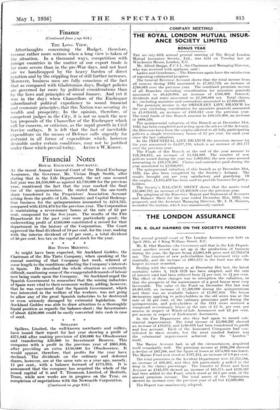Finance
-Budget Afterthoughts
As not infrequently happens, it is the afterthoughts whieli express more truly the considered view of the community with regard to the annual Budget. The first and immediate effect of Mr. Chamberlain's Budget, with its increase in the Income Tax andin the Tea Duty, was to occasion some de- pression in gilt-edged securities and even in the shares of industrial companies, the setback being due to fears of the possible psychological effect of the Budget proposals, especially those relating to the Income Tax; This very temporary depression, however, was followed by a con- siderable rally in prices on the belief that, so far as immedi- ate Movements in Investment Securities-*eie coileekted, the continuance of cheap money. to which, the ChariMlor referred' more than once in his Budget Speech, WaS:likely to be a more powerful factor than the slight rise in the IncOme Tax; while, so far as industrial shares were con- cerned, chief' attention has been given to the many indica- tions of a continuance of recovery in industrial activity throughout the coimtry...
GROWTH OF EXPENDITURE.
If we .turn aside,. however, from the more immediate effect of the Chancellor's proposals upon the Stock. Mar- kets, those in the City who have studied the Budget most closely have been impressed, not so much with the increase in the Income Tax, or the advance in the Tea Duty, or even .with the probable cost of the strengthening of the National Defences, as with the general and serious growth in the National Expenditure.
I 'am glad, for instance, to see that The Times emphasises a point to which I 'referred in my article on the Budget last week, namely, that although the present Budget may-be termed a " Defence " Budget, " it would he a public misfortune if the very proper emphasis whichis being laidupon this fact, led the country to believe that Defence alone was responsible for the proposed increases in taxation." In a year when Defence Expenditure looms so large in the picture, it is easy, says The Times, " but imprudent, to forget that the cost of Civil and Social Services is steadily and even rapidly growing." This is the point to which I drew special attention last week, and The Tithes now emphasises the fact that while the estimated. Expenditure on the Defence Services during the.coming year is £75,000,000.higher than the actual Expenditure ten years ago, the corresponding rise in the cost of Civil and Social Services is more than Moreoyer, while during the last few years the Government has saved over £80,000,000 on Debt Services, the present estimates of Expenditure show an increase of about £80,000,000 within two years, So that the total of our National Expenditure is now very near to £800,000,000.
RELYING ON BUOYANT REVENUES.
Partly-by reason of the application of tariffs occasioning a big rise in Customs Revenue, and partly by reason of the natural recovery of trade after years of .e.xceptional depression, the rise in Expenditure has been offset by the resiliency of the Revenue, and it is upon expectations of a continuance of this resiliency. that the Chancellor of the Exchequer has formed sanguine estimates with regard to the Revenue for the current year ; but even after faking this hopeful view 'with regard to Revenue, he was met with a defieit of over £21,000,000, rendering necessary the present increase both in direct and indirect taxation, coupled with a fresh raid upon the Road Fund. But that is not all. There are clear indications- that unless some strong economy movement is started, we have not yet reached the peak of National Expenditure, and while in winding up the recent Budget. Debate the Chancellor stated that the country might hope, so far as the present programme of Defence, is concerned, to escape any further increases in taxation, it is evident that such any escape " can only be pOssible by the flotation of some large loan which, in its turn. means handing on a considerable portion of the - burden of- taxation to posterity.
(Continued on page 815.)
Finance
(Continued from rage 814.) THE LONG VIEW.
Afterthoughts concerning the Budget, therefore, become rather more serious when a long view 'is taken of the situation. In a thousand ways, competition with foreign countries in the matter of our export trade is far more severe than in the pre-War days, and not least are we handicapped by the heavy burden of direct taxation and by the crippling fear of still further increases. Moreover, business men are fully conscious of the fact that as compared with Gladstonian days, Budget policies arc governed far more by political considerations than by the laws and principles of sound finance. And yet it was in the days when Chancellors of the Exchequer subordinated political expediency to sound financial and economic principles, that this Nation was securing its wealth and prosperity. In the opinion, therefore, of competent judges in the City, it is not so much the new tax proposals of the Chancellor of the Exchequer which call for concern, or criticism, as the rapid growth in Civil Service outlays. It is felt that the fact of inevitable expenditure on the means of Defence calls urgently for restraint in all forms of expenditure which, however desirable under certain conditions, may not be justified under those which prevail today. ARTHUR W. KIDDY.















































 Previous page
Previous page